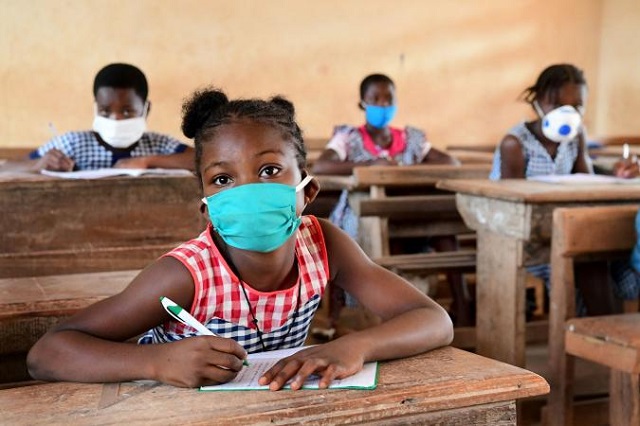
Reading lips and facial expressions are vital for learners with hearing impairments.
Kampala, Uganda | THE INDEPENDENT | Twelve-year-old Lydia Nanteza is a pupil at the Ntinda based Uganda School for the Deaf. She repeatedly pulls off her face mask to communicate with her peers and teachers.
“It (the facial mask) is disturbing me. I cannot communicate well with my friend with it on. Every time you need to lower it. At times you forget it only to be reminded by a colleague. In class, it’s worse as you cannot effectively communicate with the teacher,” Nanteza signs in despair.
Just like Nanteza and other learners, the teachers also wear face masks in line with the standard operating procedures issued by the Ministry of Education and Sports.
Juliet Mary Tumuhairwe, the headteacher of Uganda School for the Deaf notes that wearing a facial mask is very challenging for her group of learners as they cannot fully understand or interpret what the teacher is communicating with them.
Reading lips and facial expressions are vital for learners with hearing impairments. To some people, forcing learners with hearing impairment to wear face masks is the direct exclusion of the already marginalized group.
Ivan Mugoya, a primary seven teacher says both learners and teachers cannot effectively express some words like whom, serious, lips and show colours such as white with a mask on. He says that expressing emotions is impossible because they are done simultaneously with the mouth and face.
To ensure that teaching and learning takes place, Mugoya says they have bent the rules so that at least the teacher removes his or her mask during the lesson. However, there are limitations to this.
Mugoya also criticizes the recommended classroom arrangement which requires learners to sit two-meters a part. According to Mugoya, this is ineffective as such learners need to be close to the teacher to see what he is communicating.
He says that besides the hearing challenges, many of the learners have low vision.
Daniel Opio, a learner in the same class says they would very much prefer it if they had face shields since they are transparent. “I have seen people with those things (face shields). It is easy to communicate with such. However here at school, no one has it. We all wear masks yet it is difficult to communicate with them on,” Opio signed as his teacher translated for our reporter.
Asked about the challenge, the rest of the learners signaled unanimously to affirm Opio’s statement that they were facing the same problem. Tumuhairwe says that when the SOPs were presented, they tried to alert the authorities that they don’t apply to their learners. She says that they expected the Education Ministry to design special SOPs for such learners but nothing has been done.
“The only problem is that these policies are always designed from offices without any consultations from us the implementers. We are now left to suffer from the implementation of such things. The bad thing is; if they find you doing the contrary, you might land into trouble. That leaves us with no option other than enforcing what they are saying,” Tumuhairwe shares.
The frustrated headteacher says as the government allows more classes to reopen, they should think of better SOPs for differently gifted learners. Sarah Bugoosi Kibooli, the Commissioner in Charge of Special Needs Education says that at the time of procuring masks, they had made special communication to their health counterparts to distribute face shields to search learners instead of face masks.
“…such learners cannot be given a mask. For what? I was so surprised when I found out that this is what happened. The permanent secretary and I wrote a letter to the ministry of health on this matter and I think we need to make a follow-up and understand why these learners were given masks instead of face fields,” she said.
On the issue of face shields, Elias Anguyo, another teacher at the school says given the visual challenges among some learners, the face shields might not be the best solution.
*****
URN
 The Independent Uganda: You get the Truth we Pay the Price
The Independent Uganda: You get the Truth we Pay the Price


